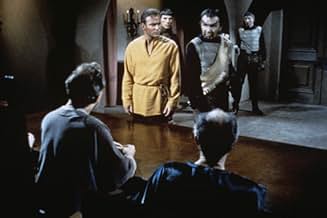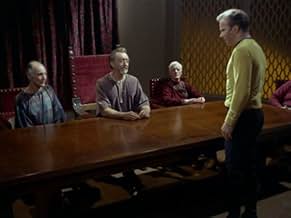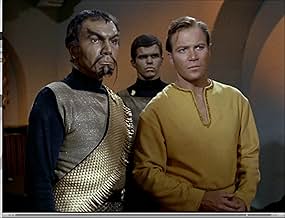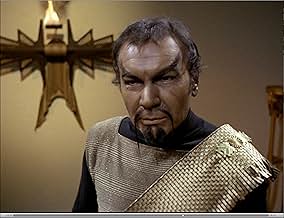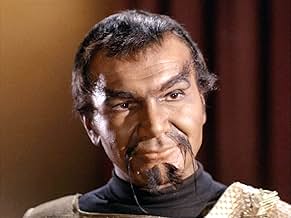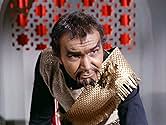Errand of Mercy
- Episode aired Mar 23, 1967
- TV-PG
- 50m
IMDb RATING
8.1/10
4.5K
YOUR RATING
With a war with Klingons raging, Kirk and Spock attempt to resist an occupation of a planet with incomprehensibly placid natives.With a war with Klingons raging, Kirk and Spock attempt to resist an occupation of a planet with incomprehensibly placid natives.With a war with Klingons raging, Kirk and Spock attempt to resist an occupation of a planet with incomprehensibly placid natives.
Bobby Bass
- Klingon Guard
- (uncredited)
Bill Blackburn
- Organian Villager
- (uncredited)
John Blower
- Organian Villager
- (uncredited)
Gary Combs
- Klingon Guard
- (uncredited)
Frank da Vinci
- Brent
- (uncredited)
- …
Eddie Paskey
- Lieutenant Leslie
- (uncredited)
Basil Poledouris
- Klingon Soldier
- (uncredited)
- Director
- Writers
- All cast & crew
- Production, box office & more at IMDbPro
Featured reviews
"Errand of Mercy" is one of this reviewer's favorite. Indeed, guest star John Colicos, who plays the series' first Klingon commander, took the part because of the excellent script. The episode involves the Enterprise being sent to peaceful Organia to prevent the Klingons from using it as a strategic location in its expansion and enslaving its apparently primitive and non-violent inhabitants. However, instead of accepting Kirk's offer of help to prevent a Klingon take-over the Organians don't appear to be the least bit interested, to the consternation of Kick and Spock. Meanwhile, in space the Federation and the Klingon Empire prepare for all out war, paralleling Nazi Germany's expansion and the US being drawn into WW II. In true TOS fashion, the plot twists take you on a merry roller-coaster ride, each more fantastic than the last. Colicos' role as the Klingon Commander is superbly acted, portraying the ruthlessness and violent nature of the Klingons. Mr. Colicos was supposed to appear in that role in future episodes, but was unfortunately unable to due to other acting obligations. A tight script and surprise ending make "Errand of Mercy" one the TOS best.
Kirk, representing the Federation, and Kor, the Klingon Empire are engaged in a struggle to save the Organians, a docile people who allow themselves to be walked all over. They don't seem to care who dominates them, not distinguishing between good and evil. Kirk and Spock self righteously decide these people need saving, despite their lack of interest. The boys begin to wage war with Klingon forces, altruistically becoming their defenders. They explode bombs and fire weapons. In the meantime, several Organians are killed to make a point. This is the first appearance of the Klingons and they are set forth as evil adversaries. The conclusion is one of the most satisfying moments in all of Star Trek because it shows us that we often lack imagination when it comes to our self centeredness. Everyone is taught a lesson.
The Enterprise crew are the first Star Fleet representatives to arrive on the planet Organia as hostilities break-out between the Federation and the Klingon Empire. Organia offers tactical advantages and is inhabited by a passive, non-progressive, agricultural, humanoid people.
John Colicos turns in a landmark performance as a Klingon colonial administrator who arrives a few minutes after Kirk and Spock, with a full military contingent (uninhibited by the Federation's Prime Directive). Colicos' Kor becomes the archetypal personality for Klingon military leaders until the Klingons are somewhat redefined in DS9. Kor establishes mercilessness as his model and begins executing Organians who do not offer complete and open cooperation. And the Organians don't care. They sit back, aloof - neither resisting nor cooperating, and frustrate both Kor and Kirk.
The episode offers a brilliant, somewhat nihilistic and humbling resolution - which you will have to see for yourself, and is one of the most satisfying of TOS. It's only negative point is the over-abundant and unnecessary 'witty banter' between Kirk and Spock as they plot against the Klingons - more subtly exploited in later Coon scripts.
Highly recommended.
John Colicos turns in a landmark performance as a Klingon colonial administrator who arrives a few minutes after Kirk and Spock, with a full military contingent (uninhibited by the Federation's Prime Directive). Colicos' Kor becomes the archetypal personality for Klingon military leaders until the Klingons are somewhat redefined in DS9. Kor establishes mercilessness as his model and begins executing Organians who do not offer complete and open cooperation. And the Organians don't care. They sit back, aloof - neither resisting nor cooperating, and frustrate both Kor and Kirk.
The episode offers a brilliant, somewhat nihilistic and humbling resolution - which you will have to see for yourself, and is one of the most satisfying of TOS. It's only negative point is the over-abundant and unnecessary 'witty banter' between Kirk and Spock as they plot against the Klingons - more subtly exploited in later Coon scripts.
Highly recommended.
Here they come...now they're here, the Klingons - aggressive, ruthless and sadistic - make their first appearance in the Trek universe. Kirk describes their society as a military dictatorship and there are parallels to Nazi rule in Europe during World War II. The Klingons take over a seemingly primitive civilization here briefly, with Kirk & Spock stuck in disguise in the center of it as a genuine war escalates up above in space (back to the folly of war as in "Balance of Terror"). The Klingons, as first presented here, are not total barbarians (tho they come close), as they do place value on glorious battle & courage in the middle of their penchant for torture, and only start executing populations when affronted somehow (well, good for them). The Klingon commander, Kor (Colicos in a sinister, threatening performance), also resembles a disciple of Genghis Khan and his marauding hordes, as if those invaders suddenly got their hands on 23rd-century technology. There's talk of political causes for the sudden escalation to war with the Federation, but how can anyone expect such an aggressively violent society as the Klingon Empire to stay out of war for any reasonable amount of time? It seems like a closed book and an inevitable outcome when trying to come up with reasons to stop the widespread hostility on display in this episode.
This may be the real motivation for the actions of the Organians in this episode. When their true nature is revealed, we get the impression they see very little, if any, difference between Starfleet (Kirk, Spock) and the invading Klingons. This attitude, of course, was on display from the beginning of the episode, causing Kirk great frustration before the truth was, er, illuminated in front of him. From his perspective, how could anyone not see the differences between his benevolent society and the slave-labor worlds dominated by Klingons? But, if you or I look down on the ground and see two armies of ants waging their little war, would we really pick a side? To us, ants are ants - why would we prefer one side to the other? However, we probably wouldn't take the trouble to stop the ants from fighting - and this is the puzzling aspect to the actions of the Organians in the end. Perhaps they realized, due to the nature of the Klingons, leaving them and the Federation to their own devices would lead to some kind of galactic devastation. Klingons continued to bedevil Kirk is several more episodes of the original series and the Trek movies. In the TNG series, they began to lean towards the honorable traits and away from the sadism.
But, this episode works on other insightful levels, from our perspective in the 21st century. Throughout the episode, it's spelled out, even by Kor himself, that there is indeed very little difference between Klingons and Humans, besides minor 'ideological' ones. Kor also has one of the better lines in this season ("I do not trust men who smile too much"). He and Kirk find themselves agreeing a bit too well on their erroneous view of the seemingly contemptible Organians and, despite Kor's amusing protests, the episode's function as prophecy seems to hold true - that eventually the two warring factions will be allies in some future. Though it does seem unlikely during this episode, it does predict the events of the "Star Trek: the Undiscovered Country" film and the TNG series. This episode also has distinct similarities to "Arena," where-in the Metrons, another highly-evolved race, also interfered with our immature warlike tendencies. The deus ex machina nature of these story lines, courtesy of such 'higher powers,' makes them a little weaker than the more hard-hitting episodes of the series, but they remain high concept science fiction.
This may be the real motivation for the actions of the Organians in this episode. When their true nature is revealed, we get the impression they see very little, if any, difference between Starfleet (Kirk, Spock) and the invading Klingons. This attitude, of course, was on display from the beginning of the episode, causing Kirk great frustration before the truth was, er, illuminated in front of him. From his perspective, how could anyone not see the differences between his benevolent society and the slave-labor worlds dominated by Klingons? But, if you or I look down on the ground and see two armies of ants waging their little war, would we really pick a side? To us, ants are ants - why would we prefer one side to the other? However, we probably wouldn't take the trouble to stop the ants from fighting - and this is the puzzling aspect to the actions of the Organians in the end. Perhaps they realized, due to the nature of the Klingons, leaving them and the Federation to their own devices would lead to some kind of galactic devastation. Klingons continued to bedevil Kirk is several more episodes of the original series and the Trek movies. In the TNG series, they began to lean towards the honorable traits and away from the sadism.
But, this episode works on other insightful levels, from our perspective in the 21st century. Throughout the episode, it's spelled out, even by Kor himself, that there is indeed very little difference between Klingons and Humans, besides minor 'ideological' ones. Kor also has one of the better lines in this season ("I do not trust men who smile too much"). He and Kirk find themselves agreeing a bit too well on their erroneous view of the seemingly contemptible Organians and, despite Kor's amusing protests, the episode's function as prophecy seems to hold true - that eventually the two warring factions will be allies in some future. Though it does seem unlikely during this episode, it does predict the events of the "Star Trek: the Undiscovered Country" film and the TNG series. This episode also has distinct similarities to "Arena," where-in the Metrons, another highly-evolved race, also interfered with our immature warlike tendencies. The deus ex machina nature of these story lines, courtesy of such 'higher powers,' makes them a little weaker than the more hard-hitting episodes of the series, but they remain high concept science fiction.
Errand of Mercy marks the introduction of the Klingons, making it an unmissable episode for Star Trek fans.
With negotiations with the war-like Klingon Empire breaking down, The Enterprise travels to the strategically-vital planet of Organia to prevent Klingon occupation. When Kirk and Spock beam down to the planet's surface, they are met by the elders, who seem most unconcerned about the situation, even when the Klingon army arrives in force. Naturally, Kirk and Spock are puzzled by the Organians' pacifism and try to convince them to fight back against their oppressors.
It's clear that there is more to the picture than meets the eye, but Kirk and his first officer seem blind to the obvious, so keen to kick some enemy butt that even the Vulcan cannot arrive at the logical conclusion: that the Organians have their own way of handling aggressors. As tensions mount and violence erupts, they finally play their hand, rendering all weapons unusable, forcing both sides to surrender. At first, Kirk is appalled that someone has seen fit to play god and effectively render the Federation powerless, the captain arguing that he has the right to wage war; however, realising how stupid this sounds, and on seeing Klingon warrior Commander Kor (John Colicos) equally horrified, he eventually understands the wisdom of the Organians' ways.
The Organians then reveal themselves to be highly-evolved incorporeal beings composed of pure energy and leave Kirk and Kor to ponder what might have been (a disappointed Kor says that war between them 'would have been glorious').
A fun episode made all the more memorable by Calicos as merciless Kor, the actor making for a truly loathsome villain (although he stops short of twirling his droopy Klingon moustache); he proved so effective at playing the bad guy that he would return to sci-fi TV as traitor Count Baltar in Battlestar Galactica.
With negotiations with the war-like Klingon Empire breaking down, The Enterprise travels to the strategically-vital planet of Organia to prevent Klingon occupation. When Kirk and Spock beam down to the planet's surface, they are met by the elders, who seem most unconcerned about the situation, even when the Klingon army arrives in force. Naturally, Kirk and Spock are puzzled by the Organians' pacifism and try to convince them to fight back against their oppressors.
It's clear that there is more to the picture than meets the eye, but Kirk and his first officer seem blind to the obvious, so keen to kick some enemy butt that even the Vulcan cannot arrive at the logical conclusion: that the Organians have their own way of handling aggressors. As tensions mount and violence erupts, they finally play their hand, rendering all weapons unusable, forcing both sides to surrender. At first, Kirk is appalled that someone has seen fit to play god and effectively render the Federation powerless, the captain arguing that he has the right to wage war; however, realising how stupid this sounds, and on seeing Klingon warrior Commander Kor (John Colicos) equally horrified, he eventually understands the wisdom of the Organians' ways.
The Organians then reveal themselves to be highly-evolved incorporeal beings composed of pure energy and leave Kirk and Kor to ponder what might have been (a disappointed Kor says that war between them 'would have been glorious').
A fun episode made all the more memorable by Calicos as merciless Kor, the actor making for a truly loathsome villain (although he stops short of twirling his droopy Klingon moustache); he proved so effective at playing the bad guy that he would return to sci-fi TV as traitor Count Baltar in Battlestar Galactica.
Did you know
- TriviaJohn Colicos intended to reprise the role of Captain Kor in a later episode Day of the Dove (1968), but scheduling conflicts with Anne of the Thousand Days (1969) prevented this. The role of Captain Kang (Michael Ansara) was written to take the place of Kor, and the performances of both actors were so excellent that they became equally legendary.
- GoofsAlthough Spock observes that Organia is a "a primitive society" which is "totally stagnant" and making no progress toward mechanization, neither Spock nor Kirk appears to notice that the doors to the Organian council chamber open and close by themselves when someone approaches. There is no evidence of any Organian opening or closing the doors.
- Quotes
Captain James T. Kirk: Well there it is - war. We didn't want it, but we've got it.
Mr. Spock: Curious how often you Humans manage to obtain that which you do not want.
- Alternate versionsSpecial Enhanced version Digitally Remastered with new exterior shots and remade opening theme song
- ConnectionsEdited from This Island Earth (1955)
- SoundtracksTheme From Star Trek
Written by and credited to Alexander Courage
Details
- Release date
- Country of origin
- Official sites
- Language
- Filming locations
- Production companies
- See more company credits at IMDbPro
Contribute to this page
Suggest an edit or add missing content

